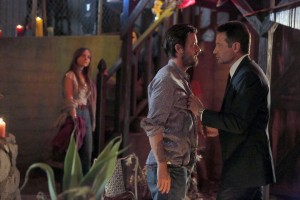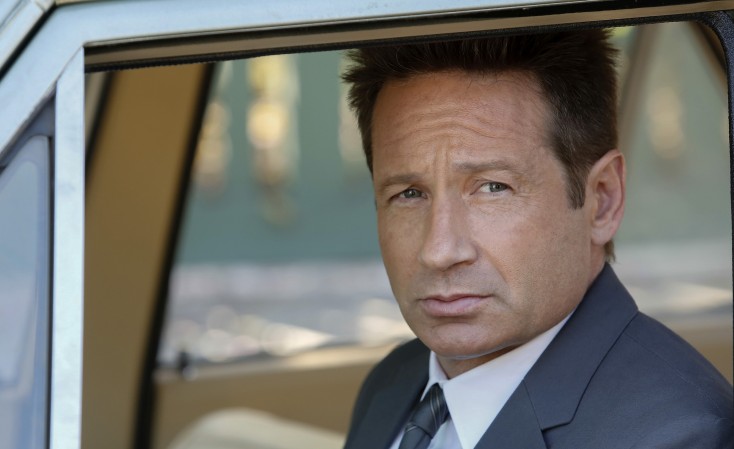
l-r) Gethin Anthony as Charles Manson, David Duchovny as Sam Hodiak at in AQUARIUS. ©NBCUniversal. CR: Vivian Zink/NBC.
****Note to Editors: expletives have been asterisked.****
By ANGELA DAWSON
Front Row Features
HOLLYWOOD—Having wrapped seven seasons on Showtime’s “Californication” as womanizing author Hank Moody last year, David Duchovny returns to network television as the star of a period crime drama called “Aquarius.”
The series, set in 1967 Los Angeles during the hippie movement, premieres on NBC Thursday, May 28 at 9 p.m. The 13-episode “event” series also will be available immediately after the two-hour premiere’s broadcast on its website (NBC.com), the NBC mobile app and other video-on-demand platforms for a four-week period.
The 54-year-old actor plays police sergeant Sam Hodiak, who is partnered with an undercover officer (Grey Damon) on a missing persons case. Their investigation will lead them to none other than ‘60s cult leader Charles Manson (Gethin Anthony of “Game of Thrones”), who later was convicted of masterminding the brutal Tate-LaBianca murders in the summer of 1969.
In April, Duchovny spoke about returning to network TV and playing a police sergeant whose investigation led him to one of the most notorious criminals in U.S. history.
Q: Why do you suppose the Manson case remains so fascinating a topic for a TV show today?
Duchovny: To me what’s interesting is Manson is a historical figure but he also has come to represent so much symbolically to us as a country as we look back on the ’60s, which is an era that we keep coming back to as if we’re looking for something.
We’re trying to figure out something from the ’60s that we haven’t figured out yet. Manson kind of stands symbolically as Flower Power—hippie, go this way, or we can go Reagan—America, Bush this way. Manson is kind of the guy, symbolically, that pushed us to the right, because this is what happens when the hippies take over— mayhem, murder, madness, all this.
This was the bull**** that was sold at the time. So it’s very interesting to me to keep coming back to this point, and I think as a country, we keep coming back to this point to try and learn again.
Q: So you were not creeped out by the idea of doing this?
Duchovny: I do “The X‑Files.” Nothing creeps me out.
Q: Speaking of which …
Duchovny: Nooooo! We’ll do that later but not now. I should have said I did “Californication.” No, I’m not creeped out.
Q: Gethin Anthony portrays Charles Manson. What did you think of his performance and why do you think he is the right actor to portray the dangerous cult leader?
Duchovny: I think what is great about what Gethin did and what he does is he’s not trying to impersonate Manson. He created a character that happens to be named Charlie Manson that he’s playing, and it’s totally his creation.
I didn’t do a lot of work with Gethin in the show because our worlds don’t really collide that much, but when I watched it, I was just amazed and just so impressed by the fact that he’s not enslaved to the ticks and the sound.
He’s not trying to be Frank Gorshin doing Charles Manson. He’s doing a character. He’s being an actor. I think that’s part and parcel with everything we’re trying to do. We’re not trying to do a Charles Manson story. We’re doing a historical fiction with characters in it.
Q: We know what happened to Charles Manson. Are you going to have subplots that the two detectives can solve within a season?
Duchovny: Yeah, the first season is full of subplots. One of the great ways that I think John (McNamara, the creator of the series) has figured out to tell the story is that when I first hear of Charles Manson, nobody’s ears prick up. It’s just a name. It’s just Charles Manson.
I look him up. He’s been arrested for being a pimp. He’s done this. He’s done that, but to me, he’s nothing. I’ve got my job to do. I’ve got other more pressing things to take care of, and I think that’s the attitude of the show, which would be the attitude of the world at that time. It’s like Charles Manson is nothing. It’s not until he becomes Charles Manson that we all turn around and look at what happened.
Q: What’s cool about being on a TV show set in the ‘60s?
Duchovny: The show is kind of this cool combination of a ’60s procedural. I don’t have access to all this bull**** CSI stuff to solve cases. We actually have to use our brains and follow clues and do police work.
Also, what makes this kind of worse police but better characters to play is that we get to crack some heads too intentionally. So we’re cops of that time. It’s a very interesting show—two shows side by side. Grey’s playing undercover (as a hippie). We’re two cops over here doing our daily job, looking at our cases, and then we’ve got this guy named Charlie Manson who’s turning into something over there while we’re looking away a little bit too much.





